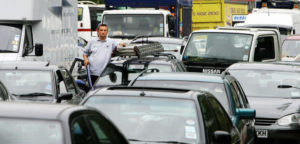Growing up as a German kid in Britain in the Seventies and Eighties, one of the things that left a lasting impression on me during our annual visit to my German grandparents was sitting in the back of their Mercedes S-Class and roaring down the four-lane autobahn at 130mph. Germany felt slick and futuristic compared to life in our sleepy, slightly scruffy village in Surrey.
Decades later, Germans are as obsessed with their cars as ever. But the autobahns are choked with traffic, and large, growling combustion engines capable of demonic speeds seem, to many, hopelessly out of sync with Germany’s self-proclaimed global leadership on environmental protection and climate change.
And so the shine is coming off German car manufacturing. Headlines such as “Share of e-cars imported from China into Germany more than triples” will sound scary if you’re VW, Audi and co. Yet official German sales statistics for April show that domestic models still occupy eight of the top 10 spots, with VW models featuring in four places. Chinese electric models and Teslas are nowhere to be seen. The ID-3 and ID-4, VW’s electric models, far outsell Elon Musk’s machines.
Germany, however, represents a tiny slice of the global car market these days. VW has long since been set on conquering the Chinese market and has done astonishingly well there. But its sales in China fell by 15% in the first quarter, including a 40% drop for electric cars. The bigger picture suggests that there is indeed cause for alarm.
The world’s largest carmaker, the Volkswagen Group, still towers over the rest, following a brief drop to second place under Toyota after the deeply embarrassing diesel scandal eight years ago, when California researchers discovered defeat software that allowed VW to fake their cars’ nitrogen oxide emissions during testing. Dieselgate, which has so far cost VW more than €30 billion in fines globally, is far from over, and threatens to inflict further damage on the brand. Earlier this month, on the 166th day of his fraud trial, Rupert Stadler, former CEO of Volkswagen subsidiary Audi, changed his mind about what he knew about emissions cheating and pleaded guilty. He is now expected to face a €1.1 million fine rather than prison.
Stadler is the first senior VW German executive to admit wrongdoing. He confessed to allowing the sale of cars to continue even though he knew they contained the emissions manipulating software. Until now, VW higher-ups had insisted they had been unaware of their engineers’ cheeky tinkering. The trial of Martin Winterkorn, former Volkswagen CEO, is on hold due to ill health, but the Stadler confession will embolden fresh lawsuits. Thousands of German drivers are already suing VW and its marques for damages — and a total of 10 million cars on German roads could, in theory, be affected. The financial consequences of damages at that scale could eviscerate the industry, which would prefer to leave Dieselgate in the rear-view mirror.
The affair was the death knell for “clean diesel”, which, ludicrously, had been sold around the world as a green fuel, not least by German manufacturers who stubbornly insisted that petrol and diesel internal combustion motors had a bright future, despite much of the industry elsewhere placing its chips on electric. Germany’s sprawling car industry is built around these two, 19th-century motor technologies, with suppliers such as Bosch and hundreds of smaller Mittelstand firms supplying VW, BMW, Daimler, Opel and Porsche — not to mention large foreign-owned factories for Ford and Tesla. By some estimates, car manufacturing accounts for €500 billion in revenue and employs, directly and indirectly, 10 million people. Electric cars, by contrast, are essentially computers on wheels, contain far fewer mechanical components and require less factory labour and more software coders.
It’s no surprise, then, that the sluggish, reluctant switch to electric has been painful. Until last year, when Musk opened a “gigafactory” for Tesla SUVs and batteries at the gates of Berlin, German car management and unions, lobbyists and politicians were all largely in denial about the need for a radical transformation. It’s too early to tell whether domestic brands can fend off Tesla, with its bottomless market cap and the threat of cheap Chinese imports.
Yet resistance to electric cars is as cultural as much as it is economic. As Ulf Porschardt, editor-in-chief of Die Welt, has written: “Internal combustion engines made by Porsche, Maserati and Lamborghini were, and are, high culture. To stop making them is as if Beethoven had stopped after the 7th Symphony, or Wagner had finished the Ring after Siegfried.”
Dramatic stuff. But depending on who you ask, Porschardt is either a shameless apologist for the country’s most corrupt and powerful industry and its dangerous, polluting and climate-destroying products — or else he’s an apostle of the values that the car has embodied in both German and Western, post-Second World War culture.
In his history of the iconic Porsche 911, Porschardt regularly defends the absence of a speed limit on German motorways: “The autobahn is the last place where we enjoy more freedom than others in the world.” It is no coincidence that Porschardt supports the Free Democratic Party, a tiny, liberal and pro-car party which recently derailed plans, pushed by its Green coalition partner, to introduce a speed limit of 130kph. Debate over driving speeds resurfaced last year as Germany attempted to reduce its dependency on Russian oil: lower speeds means lower fuel use, lower emissions and fewer accidents. But with a majority of Germans now favouring a speed limit, Porschardt and his fellow travellers are on the losing side of this very German culture war.
The car, and its place within German society, has never been so furiously debated. In Berlin, there is bitter opposition to a proposed extension of an inner-city motorway through densely populated neighbourhoods. The capital is positively brimming with community groups keen to create low-traffic “superblocks”, as Barcelona has done.
Yet, in spite of the Greens’ participation in the Scholz coalition, new motorways continue to be proposed across the country. In response, a radical new climate movement, Letzte Generation, has sprung up, so named because they believe they are the last generation that can prevent catastrophic climate change before dangerous tipping points kick in. For them, the unfettered use of “motorised individual transport”, as they prefer to call cars, must be restricted. And so they have taken to supergluing themselves to intersections and exit slipways, causing horrendous rush-hour traffic jams, sometimes even to the hindrance of emergency vehicles. This, somehow, is supposed to pressure the government to adopt more effective climate policies.
The Kulturkampf around das Auto shows no signs of slowing. Germans’ obsession with driving is deeply associated to West Germany’s emergence as an economic powerhouse from the ashes of the Second World War. According to one intriguing, provocative theory, made by writer Mia Raben in her essay “The Incapacity to Brake”, the post-war obsession with speed is directly related to Germans’ refusal to face up to the reality of what their country did to the world under Hitler, a leader, she says, they adored. “The object libido has migrated from the Führer to the car,” she wrote.
Raben’s essay title referred to a famous 1967 book, The Incapacity to Mourn, which took a psychoanalytical approach to explaining why it was so hard for ordinary Germans to look the crimes of the Nazis in the face. Even today, everything is somehow explained by the war, from the national obsession with cars to the misplaced radicalism of the environmentalists who oppose them. When I think of my grandparents — who very much belonged to the Hitler generation, and spent their lives avoiding the question of guilt for war and genocide — and how they thundered across the glittering autobahn, there is some sense to this theory. I wouldn’t be surprised if, by travelling at the highest speeds possible in their shiny, powerful Mercedes, they weren’t trying to outrun their past.
Disclaimer
Some of the posts we share are controversial and we do not necessarily agree with them in the whole extend. Sometimes we agree with the content or part of it but we do not agree with the narration or language. Nevertheless we find them somehow interesting, valuable and/or informative or we share them, because we strongly believe in freedom of speech, free press and journalism. We strongly encourage you to have a critical approach to all the content, do your own research and analysis to build your own opinion.
We would be glad to have your feedback.
Source: UnHerd Read the original article here: https://unherd.com/



